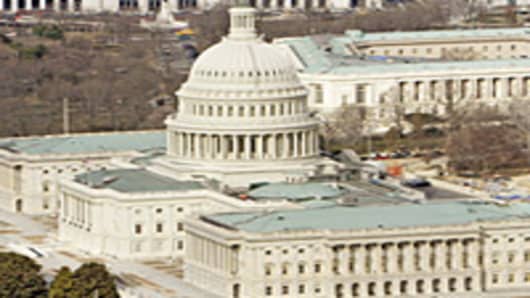Though Dodd never publicly accepted Corker's proposal, he appeared to give tacit approval by saying he was consulting with other Democratic committee members.
The issue of consumer protection has deeply divided the committee almost from the time it first began working on draft legislation late last year, following passage of a sweeping package of regulatory reforms in the House.
What's known thus far is that the agency would be part of the Federal Reserve—as is the case with the Corker proposal —but the agency boss would presumably report to the Fed chairman.
"Chairman Dodd will judge proposals based on whether or not they provide the consumer protection watchdog with sufficient independence and authority to protect consumers," said Dodd spokeswoman Kirtsin Brost.
Dodd, however, was said to have responded to the latest GOP proposal Wednesday with a counter offer, the nature of which unknown.
The offices of the other senators involved either could not be reached for comment or would not comment.
The escalating negotiations, after weeks of talks--including last weekend--suggest the two parties are finally closing in on a compromise agreement.
For some time now, the main areas of difference have been where the new consumer agency would fit into the current regulatory structure and the scope of its powers.
Democrats have pushed for a powerful new agency with rule-making, examination and enforcement powers and a director appointed by the president. But the GOP is concerned that such a structure could potentially clash with existing agencies, creating safety and soundness issues for the financial system. Republicans would also like to see fewer powers.
Moreover, Republicans do not want the consumer agency within the Treasury Department because they think it would politicize it.
Dodd's most recent proposal did just that. Corker, with whom Dodd has been negotiating for weeks on a bipartisan bill, countered with the Fed. Shelby, the ranking committee GOP who has also worked with Dodd on the reform package, originally preferred the FDIC, but has since become flexible on the matter, saying it was more a matter of authority than location.
Other senators--both Democratic and Republican--gave the Fed proposal a cold reception, reflecting current Congressional disfavor with the central bank.
The process has turned into a bit of a political free-for-all in recent days. No sooner did the Corker proposal emerge than Democrat Jack Reed of Rhode Island said he plans to offer an amendment to make the agency completely independent, which is what the House bill calls for and is also the preference of the White House.
The latest Republican proposal is said to be the result of an all Republican meeting with Senate Minority Leader Mitch McConnell Tuesday night, suggesting the GOP is now closing ranks on the issues.
In another development Wednesday, Treasury Secretary Timothy Geithner told a group of labor and consumer leaders that the Obama administration will only accept a powerful CFPA with rule making and enforcement authority and sufficient independence.
Financial Services Committee Chairman Barney Frank (D-Mass.), who worked closely with the administration on the House version of the reform bill, said he was against putting the agency in the Fed, but could accept the Treasury under the right circumstances.
Bipartisan talks between Corker and Dodd have taken place on almost a daily basis in recent weeks, with both sides stressing that some differences at this stage are solely in the language of the bill. In recent days, talks were described as fruitful and progressing.
Since his first draft was deemed dead on arrival, Dodd has been working closely with Republicans, first with Shelby and more recently Corker, after Shelby and Dodd reached an impasse in early February.
There has, however, been general agreement on other key measures in the package, which include the creation of a systemic regulator council and federal authority to wind down the operations of wobbly too-big-to-fail financial firms to avoid a shock to the system, as was the case with Lehman Brothers in September 2008.
Another problem area is the regulation of over-the-counter derivatives. Sources say it may not be included in the draft legislation underway and would instead be handled as an amendment later on in the legislative process.
Financial reform—always among President Obama's top legislative priorities—has assumed even greater importance since health care reform stalled.



